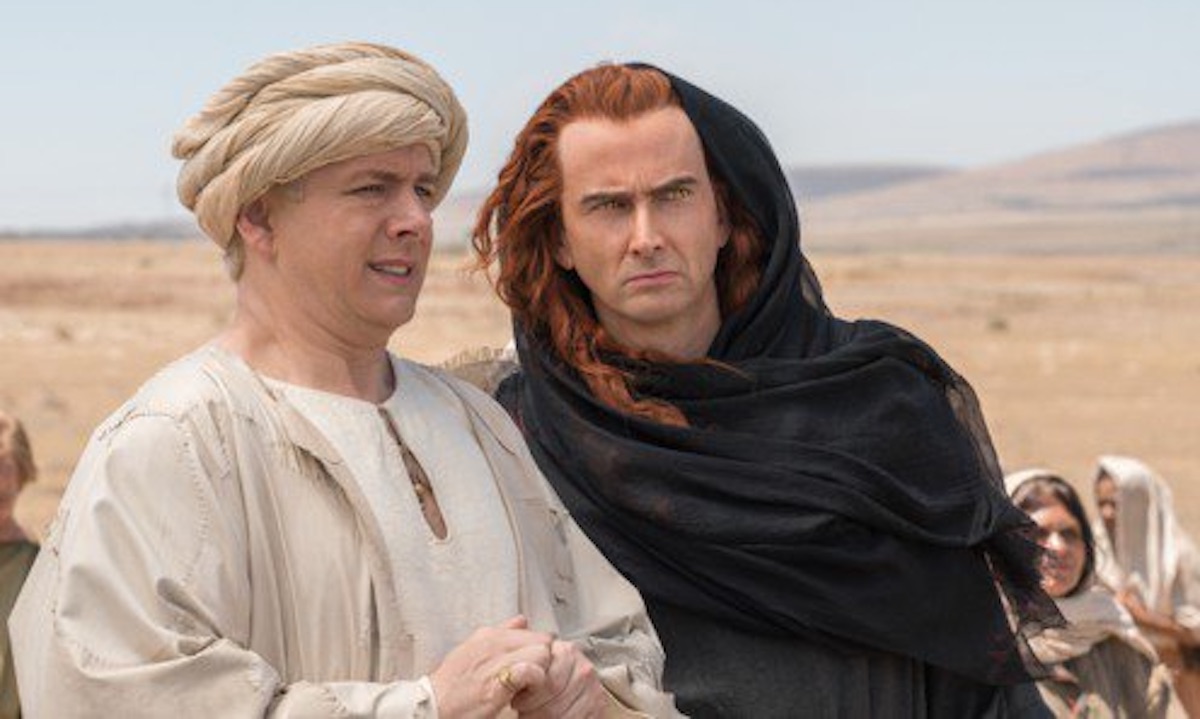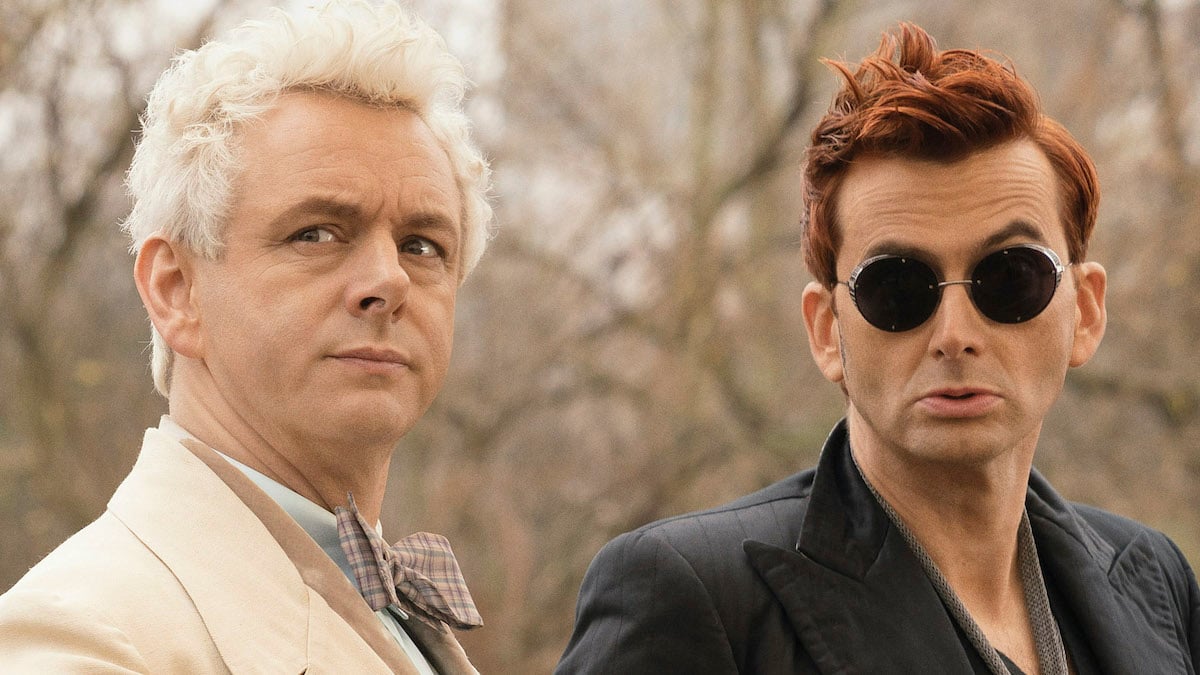The ‘Good Omens’ Season 2 Finale Gets Biblical in the Most Heartbreaking Way Possible
The nightingales aren't singing ... for now.

***SPOILER ALERT: This article includes major spoilers for Good Omens Season 2.***
Fans have been waiting for Good Omens‘ Aziraphale (Michael Sheen) and Crowley (David Tennant) to kiss since literally the dawn of time. The dynamic angel/demon duo first splashed onto our TV screens four years ago (where did the time go?) when Neil Gaiman and Terry Pratchett’s beloved novel Good Omens was reimagined as a limited series. After the resoundingly positive fan and critical response to what was originally intended to be a one-off season, Good Omens was officially greenlit for a second installment, Good Omens 2, which is streaming in its entirety on Amazon Prime Video now. But after having exhausted the full Good Omens story in the original six-episode run, Good Omens 2 was forced to break new ground and move beyond the confines of the book. The result is a season finale that ends with a heartbreaking revelation pulled straight from the New Testament.
Now, it’s no secret that part of the appeal (at least, for the very vocal online sect of fandom) of Good Omens is the pervasively charming odd couple relationship between the demon Crowley and goody-goody angel Aziraphale. In between plans for the apocalypse, the four horsemen, and some very British witch-finder shenanigans, Aziraphale and Crowley’s unlikely bond is the emotional throughline that makes Good Omens such an endearing watch. Having known each other since the very creation of the universe, Aziraphale and Crowley function like an old married couple, wandering through history together and causing miracles or mischief, depending on the day.

But as married as they may seem, the heavenly duo never crosses the line into romantic territory—at least, not in the original novel. So, with the announcement of a second installment of Good Omens, Gaiman and Co. had the unique opportunity to explore these characters beyond the scope of the book. It’s a daunting task, as there is plenty of pressure to keep up the writing quality without source material. But it is also a rare opportunity to discover new facets of Aziraphale and Crowley that the books may not have touched on for any number of reasons.
For the most part, season two doubles down on the Aziraphale-and-Crowley-through-the-years elements of the first Good Omens. We spend the majority of the first five episodes following the duo as they navigate moral quandaries and human quirks through the ages. They continue their affectionate bickering and bantering. Crowley gives Aziraphale plenty of longing looks (that Aziraphale, of course, is clueless to), and human characters continue to mistake the pair of them for husbands or life partners. It’s all very fluffy, fan service-y, and a perfectly pleasant, non-needle-bumping way to continue the story for these beloved characters.
However, things get interesting in the finale which, in addition to resolving the newly-introduced Nina/Maggie romance, sees Metatron (Derek Jacobi) invite Aziraphale to come back to heaven and replace Gabriel as the head honcho. After spending two seasons watching Aziraphale fall in love with humanity/Earth and discover that heaven isn’t all it’s cracked up to be, we’re shocked to see Aziraphale accept the offer—on the condition that Crowley be allowed to come with him, reinstated as an angel. Certainly, from Aziraphale’s point of view, this would be a win-win scenario: both he and his best friend will finally be allowed back into heaven together and can use their new position of power to shape eternity for the better.

But of course, going back to heaven is the last possible thing Crowley wants to do. Aziraphale’s invitation leads to a heartbreaking conclusion in an otherwise warm, lighthearted season. Crowley is understandably baffled that Aziraphale thinks he would want to go back to heaven, and says as much. Over the course of this entire season, we’ve watched him slowly but surely come to terms with the fact that his feelings for Aziraphale may veer into romantic territory. And with some encouragement from Nina, he had resolved to confess those feelings to Aziraphale, had the angel not beaten him to the punch with the heaven invite first.
Furious, frustrated, and heartbroken, Crowley pours his heart out in one last appeal to Aziraphale. The issue of heaven has always been a major sticking point in their friendship, and here the differences have never been more cruelly exposed. Aziraphale, despite knowing how awful heaven can be, is still drinking the Kool-Aid. Crowley, on the other hand, has finally decided that he’s willing to put his heart on the line and pursue Aziraphale as more than just a friend. So the sudden invitation isn’t just a slap in the face to everything Crowley stands for: it’s a rejection of the idea that Crowley and Aziraphale would be able to run away together and live a life outside the gaze of heaven or hell.
Adding insult to injury in this already tragic altercation is that Crowley and Aziraphale are having this discussion just moments after watching Beelzebub and Gabriel (another angel/demon duo) confess their feelings for each other and successfully leave their respective heavenly bodies behind. Crowley has seen, after millennia of uncertainty, that running away together is a viable option. But by the time he’s worked up the courage to propose eloping to Aziraphale, the angel already has plans to return to heaven.
What comes next is a moment fans have been hoping, praying, and begging for: Aziraphale and Crowley finally kiss. But it’s not the sweeping romantic moment fans were hoping for. The true context of Aziraphale and Crowley’s first kiss is decidedly tragic: it’s a last gasp from Crowley, a sort of brokenhearted acceptance and a final “goodbye”. Crowley puts every emotion he has into the kiss, trying to convey feelings Aziraphale hasn’t been able to pick up on for centuries. And when they pull away, Aziraphale delivers the most brutal line of the season: “I forgive you”.

The moment, of course, is eerily reminiscent of Judas’ kiss of betrayal to Jesus Christ—a moment of tenderness just before the tragedy. Crowley storms out, devastated at what seems like a rejection, and we watch as Aziraphale’s hand lingers over his lips, confused and similarly heartbroken. For Aziraphale to “forgive” a kiss from Crowley almost feels cruel, especially on the heels of Beelzebub and Gabriel’s happy ending. The exchange is a brutal gut-punch of an ending to an otherwise airy season. Though initiating an “ineffable divorce” certainly lays some interesting groundwork for a third season, the framing of Aziraphale and Crowley’s first kiss as a moment of tragedy and borderline betrayal (as opposed to an epic romantic moment) is a heartbreak of biblical proportions.
(featured image: Prime Video)
Have a tip we should know? [email protected]